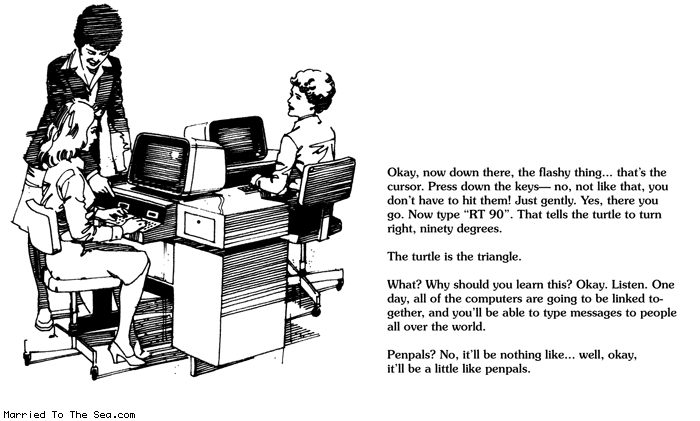The opinion a teacher has of the potential of ICT in the primary classroom often reflects the learning environment that they create. In their research, both Smeets and Robertson notice an overall positive attitude to ICT amongst educationalists in the
Smeets discusses the need to create a positive and open learning environment, and the ways in which ICT can be used to foster such an atmosphere. The two forms of ICT program or activity which are discussed in both articles, have been labelled, ‘skill-based’ and ‘open-ended.’ Smeets observes that skill-based software is used substantially more often than the other (Smeets p.350). Within this trend, Smeets findings indicate that this kind of ICT task is most commonly used in presenting learning materials, or as a form of remediation for less-able pupils. The findings of his research show a tendency to use ICT as a tool to serve the teacher’s lesson aims, rather than a gateway to open-ended and self-guided learning. Therefore, the results show a restricted, individualistic use of ICT which simply fits into traditional views of teaching and learning. Smeets asserts the importance of using open-ended applications, which challenge pupils information-processing skills, support co-operative learning and contribute to bridging the gap between school and the ‘real’ world (p.352-3). These programs are important in contributing to a powerful learning atmosphere which gives autonomy back to the learner and challenges their ability to process and analyse information. The study identifies various ways in which a learning environment could be called powerful and learner-centred, most of which allude to collaborative, active and relevant tasks (p.348-9). It is through the process of allowing the child to learn and their own pace and in a way that consolidates the meaning of the activity most effectively for them that a powerful learning environment is achieved.
Though all the teachers involved in Smeet’s study had a positive idea of the use of ICT, his results show that very few of them were able to use ICT to its full potential in contributing to a powerful, challenging and exciting learning environment. Smeets attributes the absence of effective ICT teaching to the teacher’s lack of knowledge and confidence in the subject (p.352). This is however, according to Robertson, merely a complaint added to every new initiative and strategy which teachers willingly yet dispassionately attempt (Robertson p407). Roberston questions the immediate response of educational researchers to investigate ICT in terms of management and teaching styles, funding levels and resource allocation; all rational areas for discussion of school-based issues (p407). His alternative is to offer several “alternative” avenues, which are found in broader, research-based subjects and which produce questions about educational change, gender issues in relation to technology.
Reflection
I have found in my own experience of ICT in schools, that there is some apprehension surrounding the use of ICT programs in any other way than as brief support-materials during a lesson. The majority of teachers use drill and practise software such as word processors and spreadsheets as an add-on to their lessons which will fulfil the ICT quota. However, this use of ICT creates a distinct gap between the use of ICT in school and elsewhere. Teachers must recognise that children are surrounded by opportunities to use ICT and that the skills they require are not those which can always be honed by word processing or creating a powerpoint presentation. Children need to be given the chance to experiment with a range of computer programs and other technologies in order to keep-up with our technologically advancing society. Skills in critical reading, gathering research and co-operative work can all be developed through the use of open-ended ICT activities. The teacher is not required to hand complete responsibility to the learner and must be on-side as a technology user to help understanding and acquisition of skills, but independent learning must be encouraged in order to develop a powerful ad constructive learning environment. I agree with Smeets’ observation that a classroom that encourages engagement and active learning is a place where cross-curricular opportunities are made possible, as learning tasks are generally relevant and ‘real’ to the learner. A good example of an open-ended task would be to create a themed Geography webquest, or to plan an event or trip. These tasks are directed but leave decision-making and discernment to the learner; skills which cannot be developed merely through word processing poetry.
Throughout my school-based training I have seen a lack of ICT being used in schools, and my experience almost directly reflects Smeets’ research findings. It seems that teacher’s general worry is that while ICT is an interesting and incredibly useful learning tool, it is so vast that the tendency is to stick with only one or two programs and strategies within ICT. I was able to use digital photography, interactive whiteboard presentations, CD-Rom searching and sound recording during my placements, and these lessons and activities were met with excitement and enthusiasm from the children. Given the opportunity to experiment with ICT, children’s level of engagement with the topic or task greatly increased, and all children were actively involved in their own learning.
References
Smeets, Ed, ‘Does ICT contribute to powerful learning environments in primary education?’ Computers and Education, 2005
Robertson, John, ‘The ambiguous embrace: twenty years of IT (ICT) in

